Exploring the Millennium Ancient Road in Western Beijing
The weather was fine on the weekend, and my wife talked about going to the Horseshoe Nest for a long time. It happened that the children had classes on Saturday and they didn't need to play with them, so they drove there. We went to Xishan Avenue, also known as Xishan Ancient Road North Road. The original avenue basically runs along the Yongding Valley and is the oldest ancient road in western Beijing. Xishan Avenue starts from Sanjiadian in the east, passes through Yongding River, passes through Liuliqu Village, passes through Chou 'er Ridge, passes through Xiehejian, Shuiyuzui, Fanniu' er Ridge, passes through Qiaoerjian, Magezhuang, Shiguyan, Seshufen, and reaches Wangping Village. This is the main line of Xishan Avenue. There is a road from Wangping Village to Wangpingkou and to Zhaitang River. In the past, most of the coal produced in the Zhaitang area was transported out of the mountains through this ancient road. There were a large number of clear hooves left on the road surface of the crossing line at Chouerling and Niujiaoling. This ancient road is the longest used one among the ancient roads in western Beijing. It was not until the Xia 'an Highway was built in 1977 that this ancient road was naturally abolished.
The Jingxi Ancient Road Scenic Area is now located in Shuiyuzui Village, Miaofengshan Town, Mentougou.
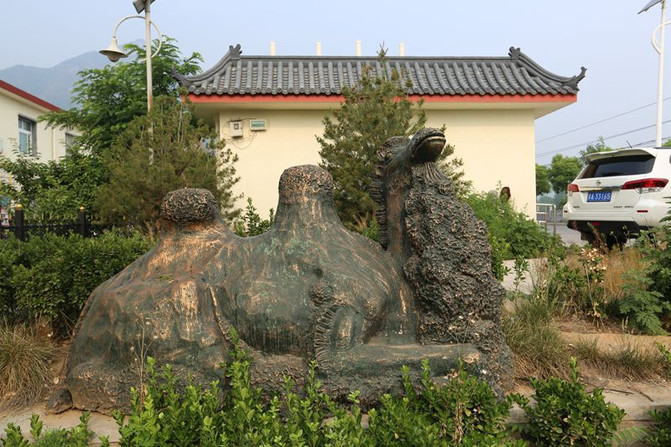
Sculpture at the entrance of Shuiyuzui Village
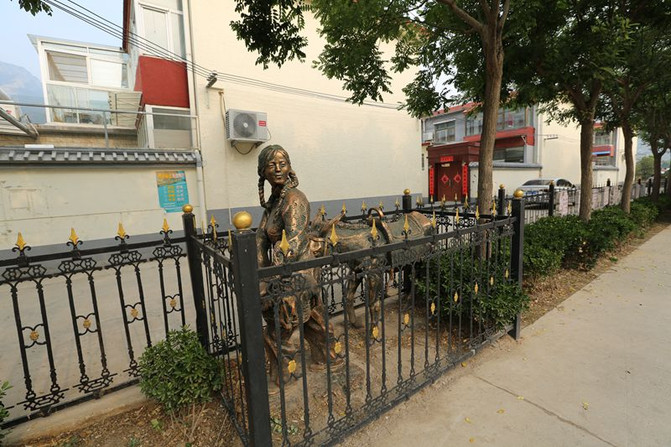
Sculptures on both sides of the road in Shuiyuzui Village
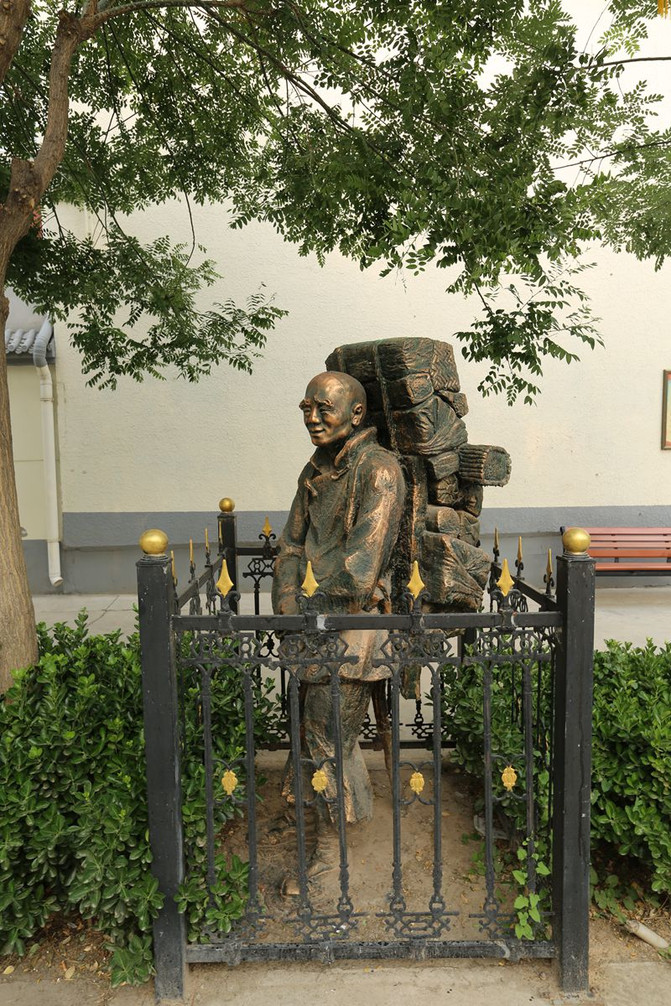
Sculptures on both sides of the road in Shuiyuzui Village
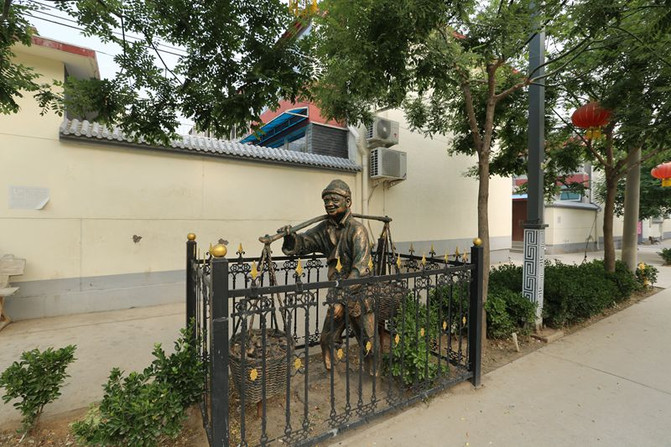
Sculptures on both sides of the road in Shuiyuzui Village
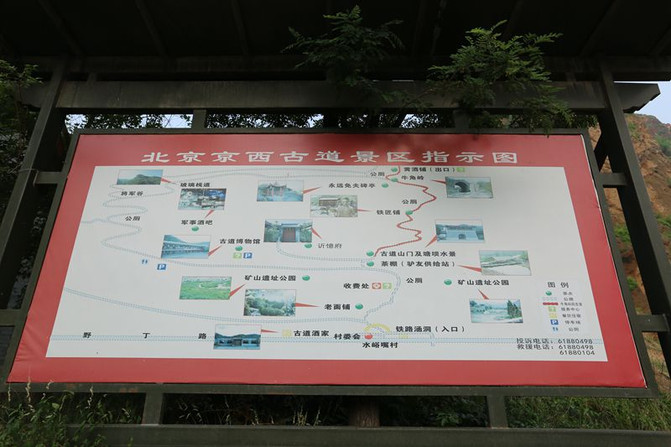
Ancient Road Tour Map
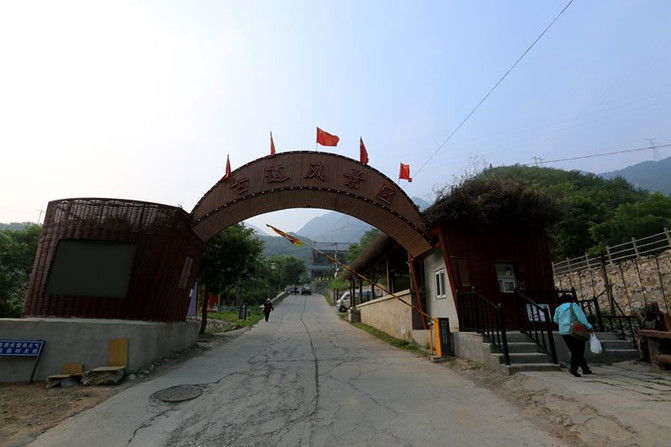
Ancient Road Ticket Office, ticket price is 27 yuan
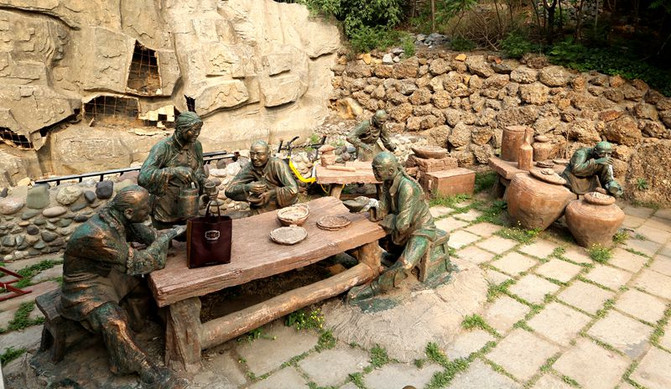
Sculpture next to the ticket office of the ancient road
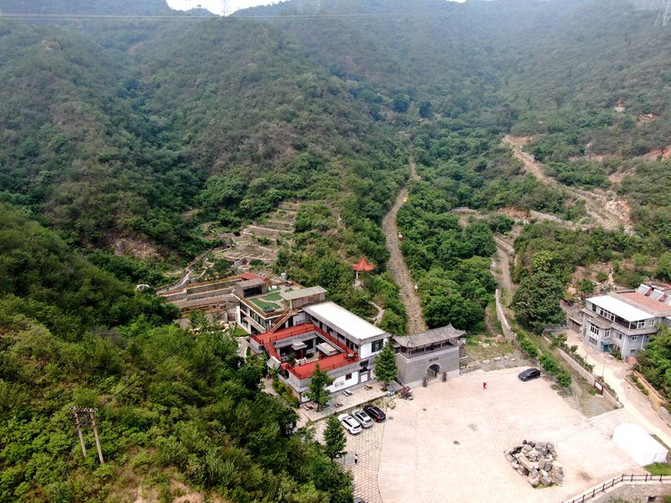
Aerial photo of the entrance of the ancient Jingxi Road
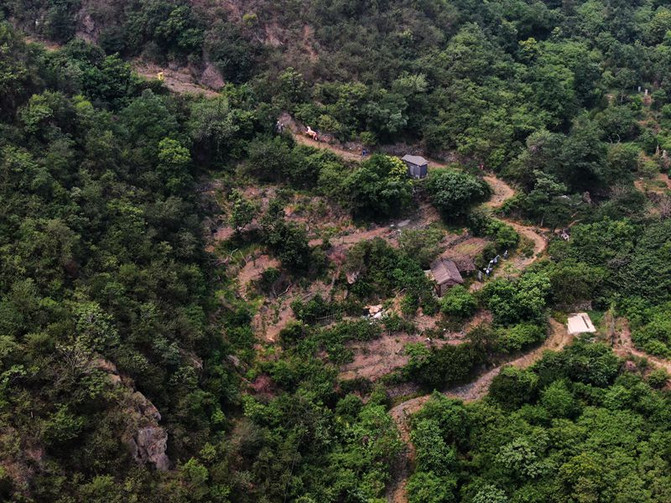
The winding ancient road (aerial photo)
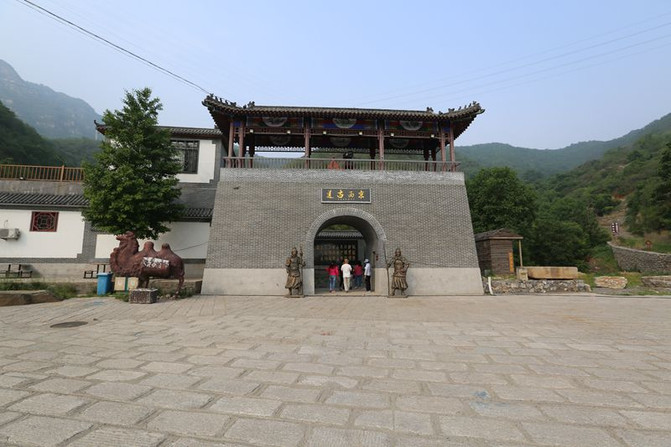
Ancient Road Entrance
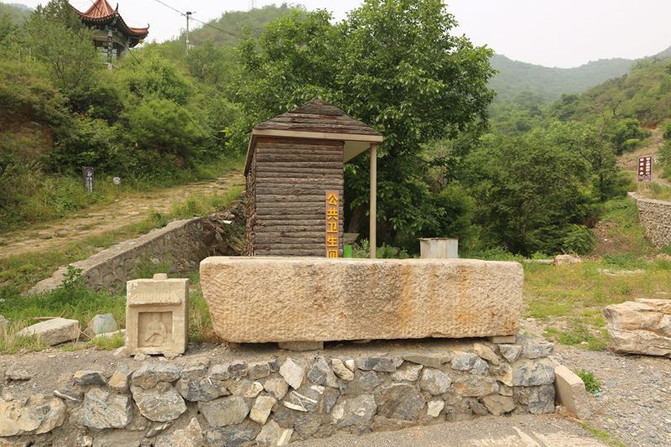
Stone troughs and sculptures at the entrance of the ancient road
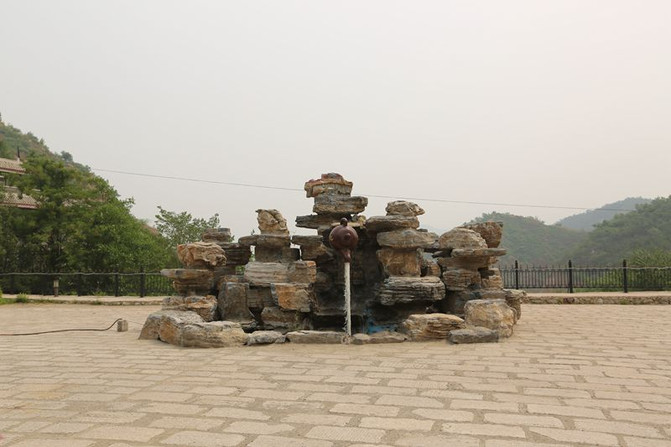
Rockery at the entrance of the ancient road
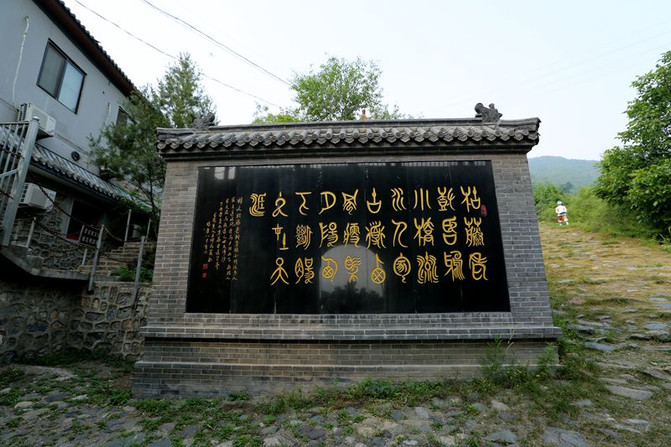
Shadow wall at the entrance of the ancient road
There are many ancient roads in the Mentougou Mountains, which were the only roads for local villagers to enter and exit at that time. Most of these roads are mountain roads, which have been ground by people with their feet for generations. Among them, the main road was built with funds from the government or businesses and was paved with rocks. The road surface is generally about 2 meters wide, mainly for convenient transportation by pack teams.
At that time, the coal produced in the Mentougou mountainous area was mainly transported by large livestock such as donkey snails. Carrying teams continued day and night on the ancient road. For thousands of years, the iron palms of donkey snails left deep hoof nests on the hard stone surface. Nowadays, these hoof nests are still preserved in many places, from which we can see the busy scene of coal transportation at that time.
The length of the ancient road that can be visited is about 2 kilometers.
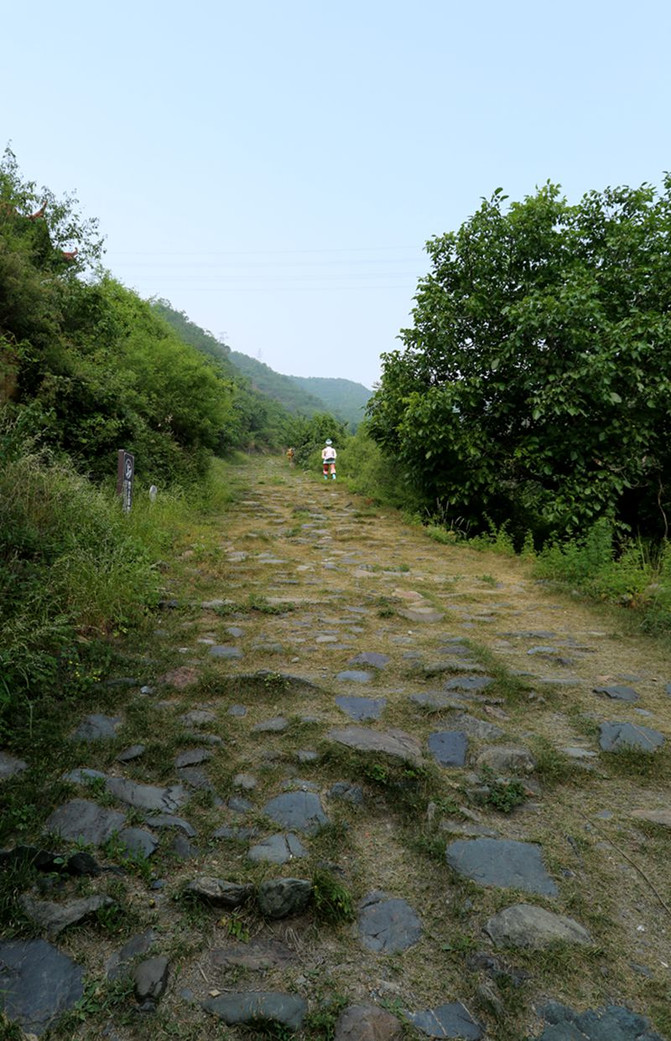
The impression of the ancient road in western Beijing should be that there had been a lantern festival. There were many colorful lanterns and sculptures on both sides of the road, but unfortunately many of them have been damaged.
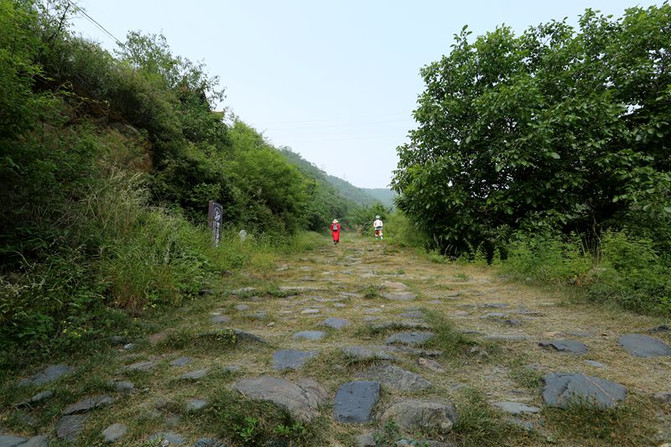
Impression of Jingxi Ancient Road
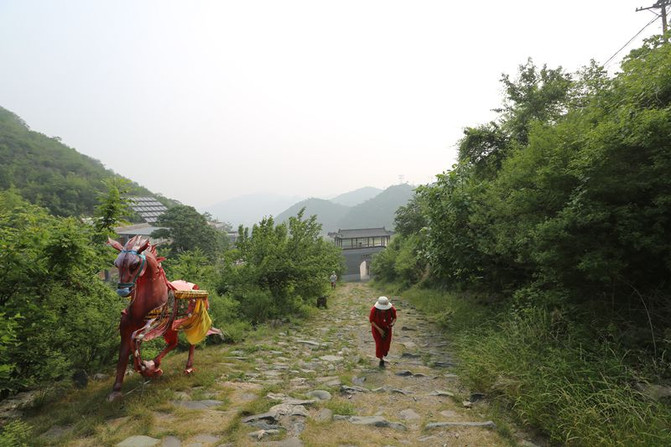
Impression of Jingxi Ancient Road
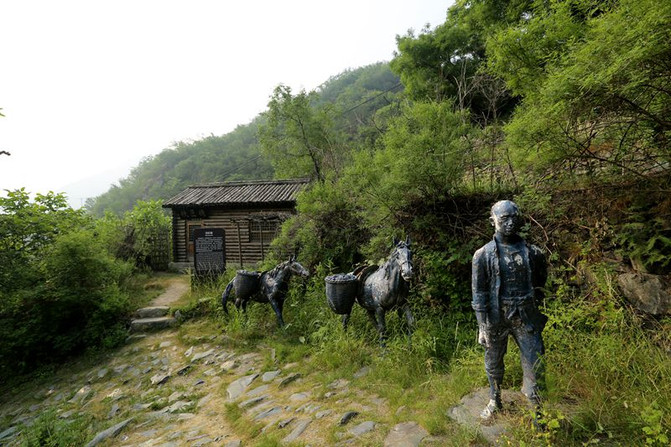
Impression of the Ancient Road in West Beijing--Blacksmith Shop
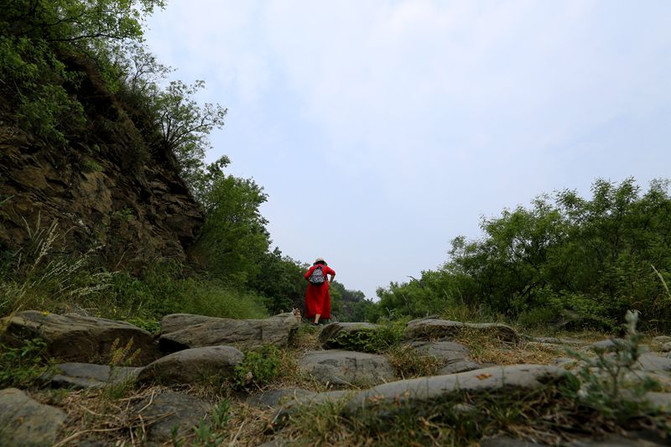
Impression of Jingxi Ancient Road
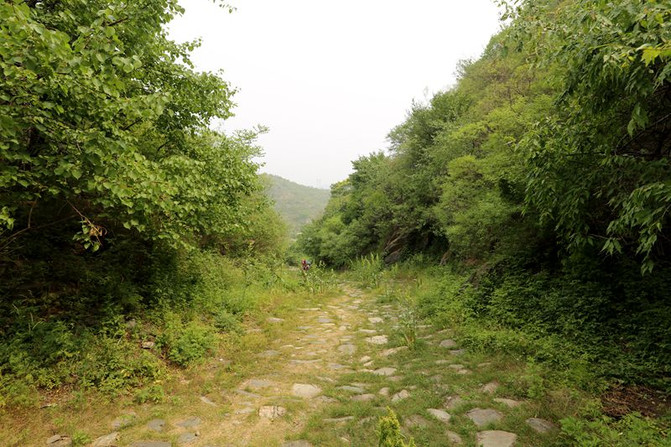
Impression of the Ancient Road in West Beijing-The grass on the busy ancient road in the past was already about 1 meter high because there were few people walking.
Niujiaoling, the ancient road route, was the boundary between Nanxiang Zhuwei Township and Wangpingkou Inspection Department in Wanping County during the Ming and Qing Dynasties. Guancheng was built and was an important pass on Xishan Avenue. Guancheng City is located at the intersection of the two slopes, guarding the key point of the ancient road. Niujiaoling Guancheng faces east and west. It is constructed of masonry and bricks. It is built directly with stones on the rocks. Blue bricks are on the sides and bluestone are used as legs. The door opening is 7 meters high, 9.3 meters deep, and 4.3 meters wide.
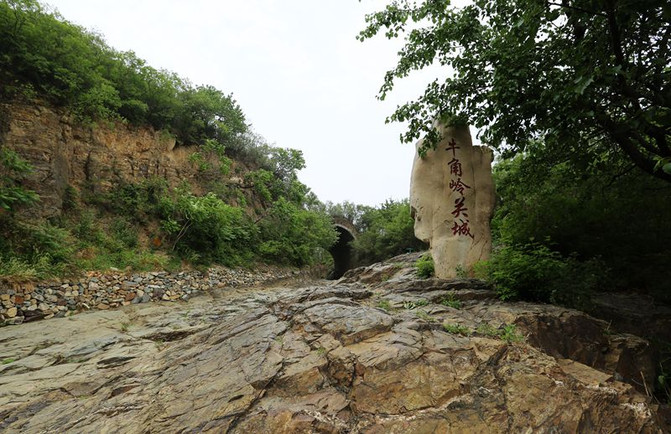
Niujiaoling Guancheng
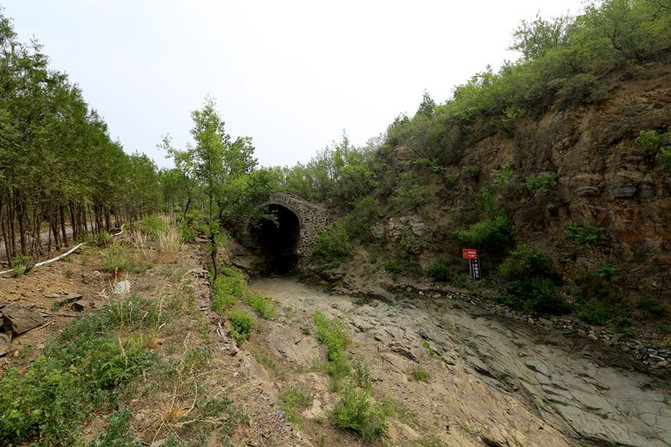
Niujiaoling Guancheng
There are a large number of obvious hoof nests left on the road on both sides of Guancheng, about 300 of which are deep, and the deepest one is 30 centimeters.
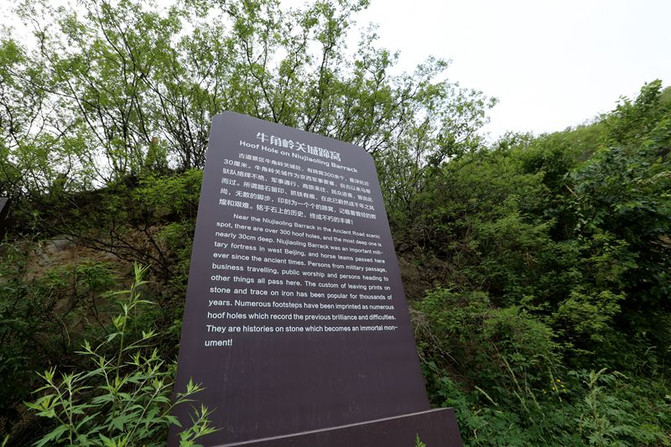
Hoof Wo Profile Board
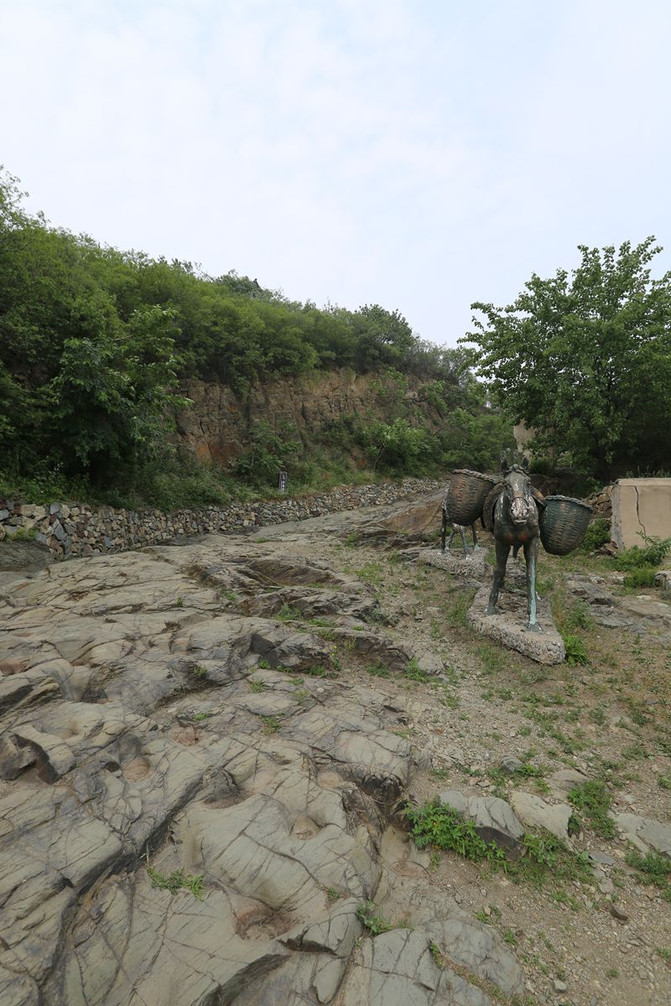
Niujiaoling Tiwo
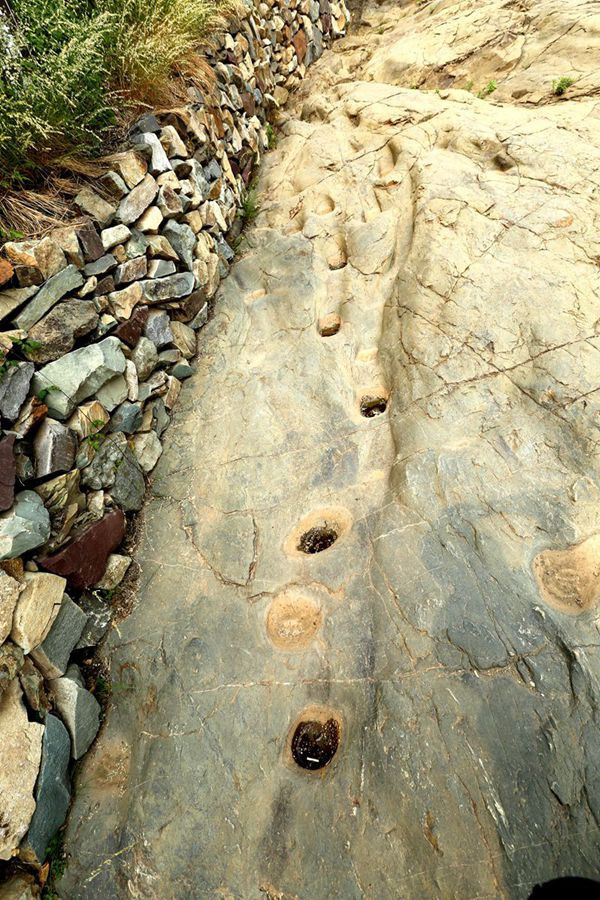
Niujiaoling Tiwo
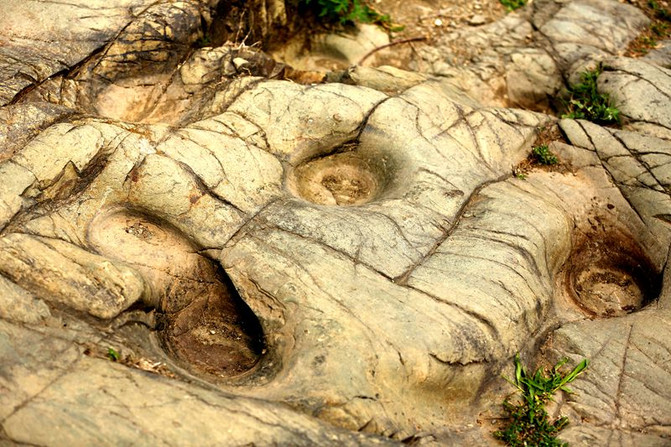
Niujiaoling Tiwo
There is now a "Forever the Border Monument" erected in the 42nd year of Qianlong of the Qing Dynasty (AD 1777). The stone tablet was once left on the roadside and lying in the grass. After more than 240 years of wind and rain erosion, the inscription has become blurred and difficult to distinguish, and the body of the monument has also been damaged. In 2007, an antique hexagonal stele pavilion was built on the east side of Niujiaoling Pass to house the stele.
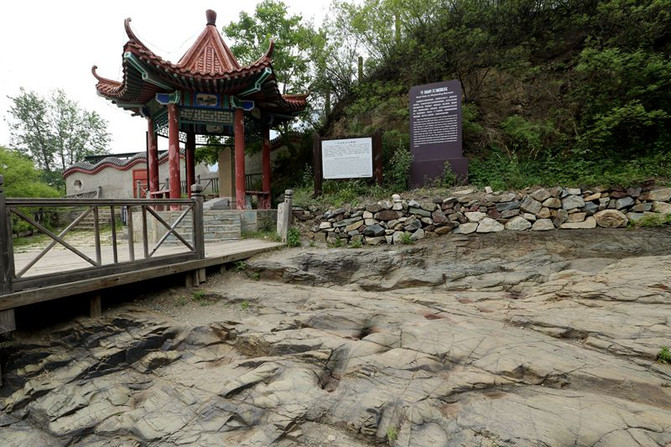
Six-Corner Stele Pavilion
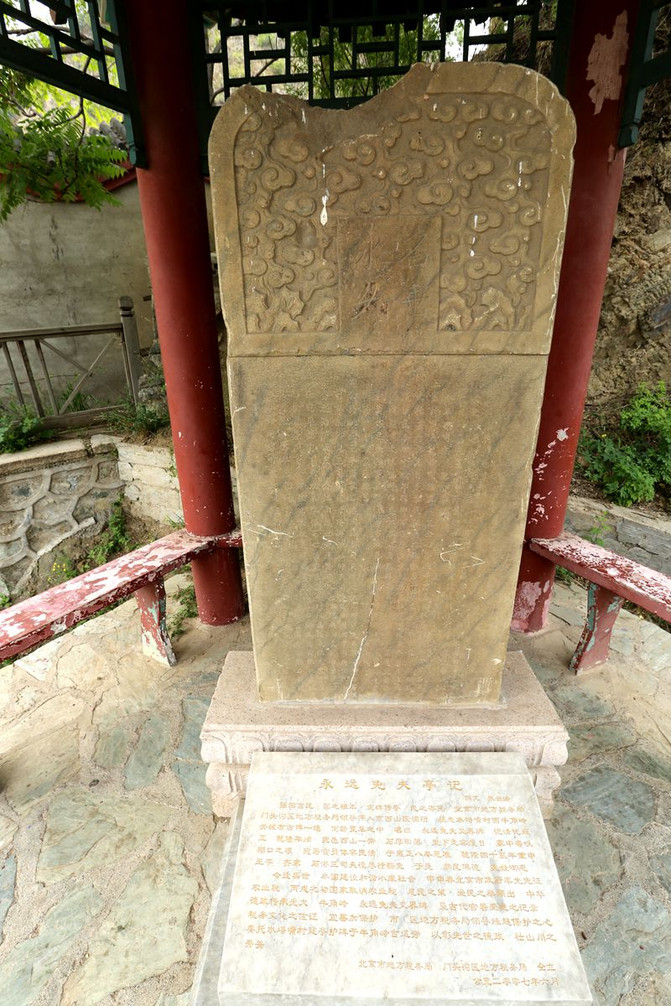
Forever Free Husband Border Monument
The "Forever Husband Border Monument" is a concrete manifestation of the Kangxi and Qianlong policy of "prospering the prosperous times and never increasing taxes". Because the inscription is blurred, I couldn't see why after a long time on the spot. When writing this travel note, I consulted the information and found the content of the inscription and copied it in full.
Inscription: The name will last forever
I once observed the ancient Xunliang, who were famous for their achievements in gold and stone, and never lingered without sighing three times. Fortunately, we have celebrated the prosperous times today and received the rule of Lord Huang in our county. For example, in the Xishan area of Wanyi, we have scattered villages and ruins, and half of the flag bearers live together. The stones are thick and the fields are thin. We live in kilns down the countryside. We respond to the mistakes of our families. Every time we feel the difficulty of living, we are far away from Beijing, and we cannot bear the pain of the journey. Therefore, during the eight years of Yongzheng, Duke Ruan, the chief secretary, submitted a detailed constitution, praying for the exemption of Fu Chai. Fortunately, the chief secretary of the county, Wang Ping, Qijia, and Shigang, were granted exemption from all service. Therefore, the people of Li Pei De had the surname of Zhao En. One set up a monument in front of Wanping Office, and the other set up a road for Wang Ping. For more than 40 years now, I have paid homage to it, but I can't help but feel sorry. Why are there many major dispatches and prosperous service supplies? I suddenly heard the call of urging dispatches and saw the connection. Alas! Kuang Dian cannot be used to invite special favors again, how can it be used to repeat it? However, don't do it before, although it is beautiful but not famous; don't do it after, although it is prosperous and not passed down. We do not presume to take the liberty of expressing our feelings. We have received our Lord Huang's observation of the people's reclusions, and have given us a new application. We have received our Lord Huang Gongjun's approval to investigate Wang Ping, Qijia and Shigang, and to collect the recruitment of civil servants in all villages. We have been exempted from the record for a long time. Zhun advised Fang Zun to follow the previous detailed instructions and exempt the three divisions from service, and no longer be sent to relieve the people's poverty. Hehe, how lucky are you to be born under the rule of Lord Huang? Fu Gong was from Piaoyang County, Zhenjiang Prefecture, Jiangnan, nicknamed Ruiding, also known as Jinghan. He was appointed by Xiao Lian as the chief governor and Ren Wanping. I recall that since I got off the bus, I have been loyal to my family, and have been diligent in administering politics. I have leveled penalties to end litigation. I have cleared all grievances. I have been cautious and meticulous, and I have eliminated all the shortcomings of the procuratorate. Implementing good rules is even more difficult. Hundreds of millions of people are mindful of their hearts and exemptions from taxes and corvee. Although they maintain their sincerity, they hope that there will be no different news in those years. However, Kong Er started singing, how can they bear to be buried in future generations? Yu and others work together to use their sincerity, cut stones and carve steles, so as to demonstrate virtue, speak out, comfort the legacy of Gan Tang, promote benefits and eliminate disadvantages, and forever maintain the etiquette of the throne.
At that time, grain Dan was established in August in the forty-twelfth year of Qianlong of the Qing Dynasty
Fu Xiang: Shen Jiucheng, Liu Tingyu and Sun Yongqi wrote it.
When checking the data, it was said that there should be a "Monument to Rebuild the West Mountain Road" erected in the 11th year of Tongzhi of the Qing Dynasty (1872), but it was not seen at that time, and the inscription was copied here.
The inscription says:"I heard that building bridges to facilitate people's crossing, building roads to facilitate people's walks, and serving the righteousness of the people. This is the first good act. Moreover, the Xishan area relies on Wujin for its physiological resources, and the use of cooking in the capital is particularly indispensable. Roads are suddenly blocked, and the livelihood of all walks of life is at stake. "The inscription records the situation of Tongzhi 10 years ago, heavy rains caused disasters, washed away roads, and people took good measures to repair roads. At that time, commercial shops in Sanjiadian Village and Liuliqu Village were mainly donated to build roads. There were 14 coal factories in Sanjiadian Village and 3 coal factories in Liuliqu Village, indicating that this ancient road was the economic lifeline of coal merchants.
Opposite the stele pavilion, there is a poem written by Mr. Shi Changpu (Shi Changpu is a native of Yanhe City, Zhaitang Town, Mentougou District, and was once the director of the Institute of Educational Science in Mentougou District) in memory of General Mao Lifang: "Thinking of the Past in Niujiaoling Guancheng-Commemorating General Mao Lifang." General Mao Lifang was a native of Yuyao, Zhejiang Province. In the third year of Chongzhen of the Ming Dynasty, he fought with the Later Jin Army in Jiulong Avenues at the foot of Lingshan. He and local gatekeepers Zhang Bing and Zhang Guiqi were eventually captured because they were outnumbered. The Later Jin Army "helped the General surrender and lure him to gain great profits", but was scolded and scolded by the General,"It would be better to break jade than to build a complete piece of land." The General committed suicide and died for the country. After the reinforcements arrived, they all shed tears and hatred, so they fought bravely to kill the enemy and wiped out the Later Jin Army here.
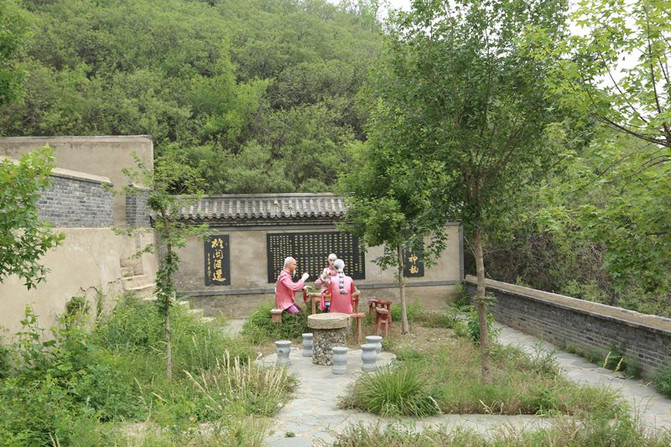
Commemorative poems
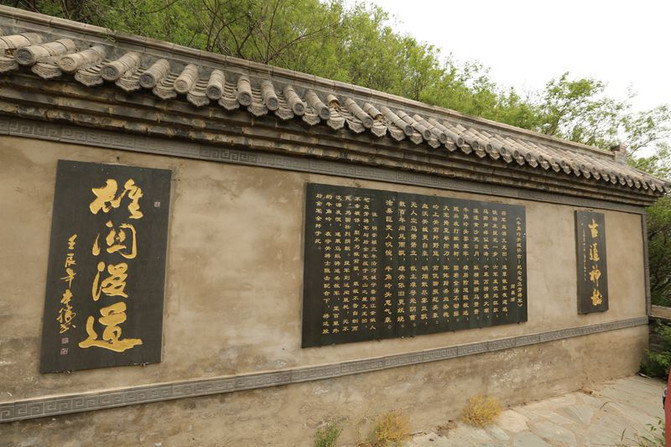
Commemorative poems
After passing Guancheng, there is a Guandi Temple, also called Laoye Temple. It is said that the original temple was originally dedicated to Emperor Guan Sheng and Sister Yang, but was destroyed during the war. The current temple was rebuilt in Shuiyuzui Village on the original site in 2012.
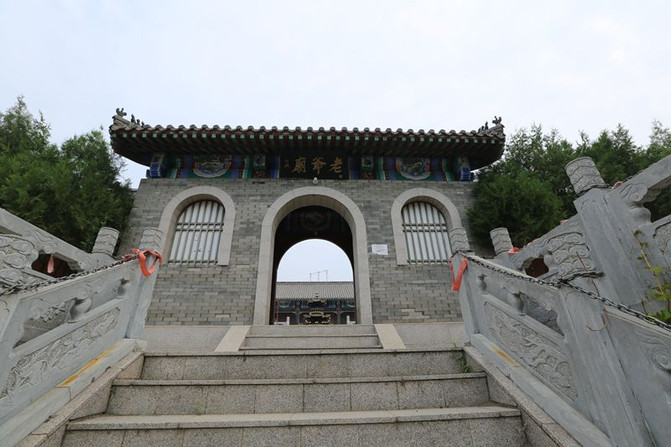
Laoye Temple Impression
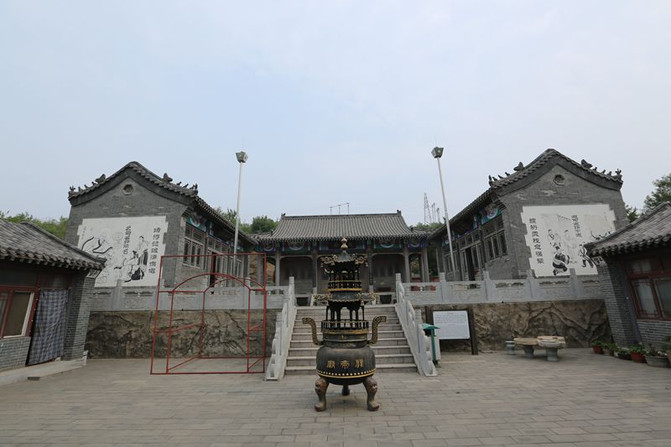
Laoye Temple Impression
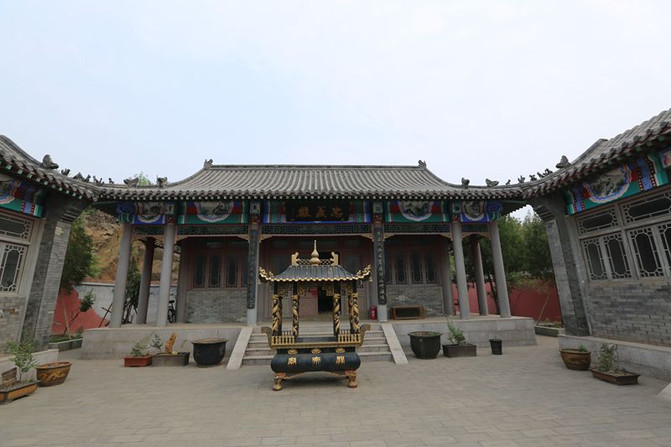
Impression of Laoye Temple--Zhongyi Hall, Main Hall
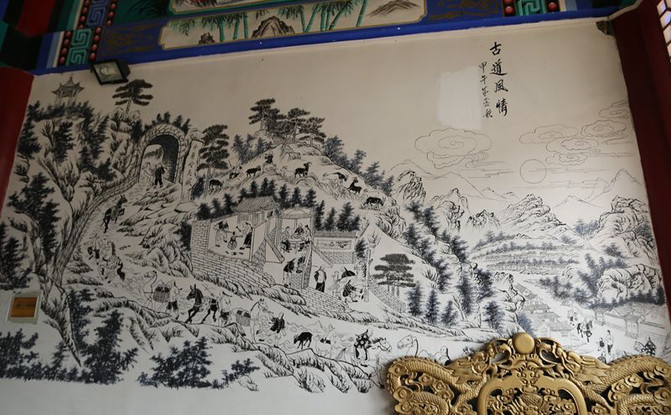
Murals in the main hall
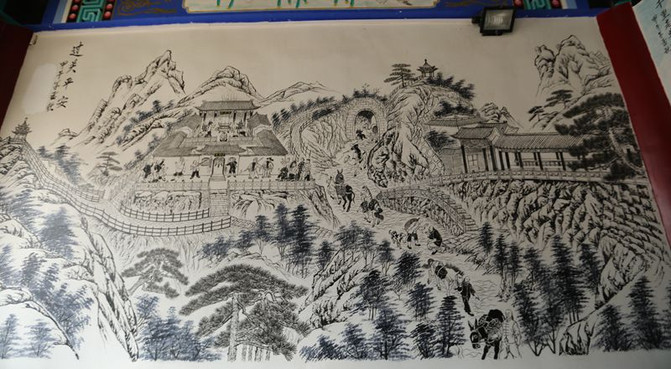
Murals in the main hall
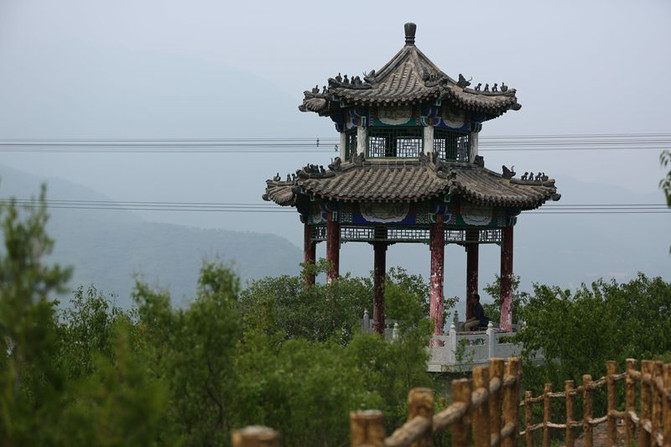
viewing Pavilion
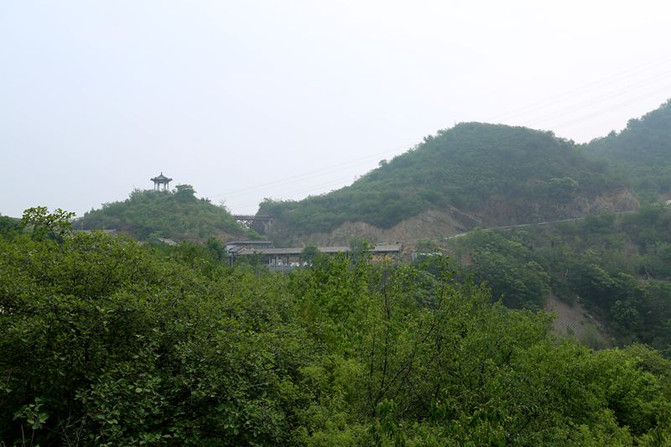
Overlooking the glass plank road
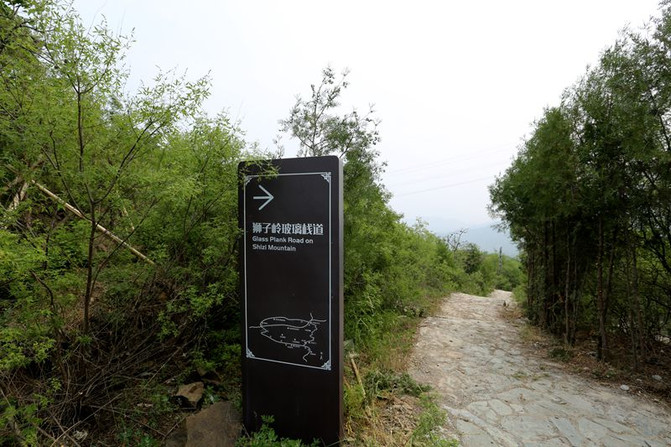
Glass plank road entrance, but not open
After visiting the Jingxi Ancient Road, you pass Jiuyuan Village in Wangping Town, which is the crossing of another "Wangping Ancient Road." The "Wangping Ancient Road" passes through the villages and towns of Wangping, Datai, Muchengjian, Zhuanghu Village, Qianjuntai, Zhangjiacun, Qilifen in Mentougou District, and then reaches Junxiang Township and joins Jingxi Avenue. Jiuyuan Village consists of four villages: Jiuyuan Village, Dongluopo Village, Xiluopo Village and Qiaoerjian Village. In the small mountain village of Xiluopo, there is an ancient house of the Yuan Dynasty. According to generations of the villagers of Xiluopo Village, this is a famous opera artist and dramatist. It has been praised as the "Horse Fairy" by later generations and is known as the "Qu No. 1 Champion". It is the former residence of Mr. Ma Zhiyuan, who is also known as the "Four Great Masters of Yuan Opera" with Guan Hanqing, Zheng Guangzu and Bai Pu. His work "Tianjingsha·Qiu Si" is called the ancestor of Qiu Si.
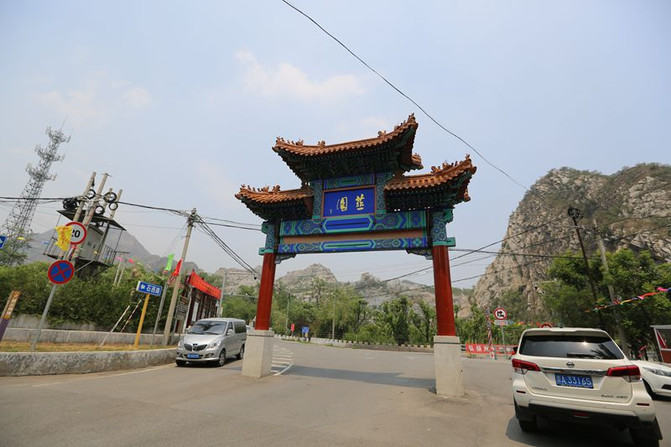
Jiuyuan Village Pailou
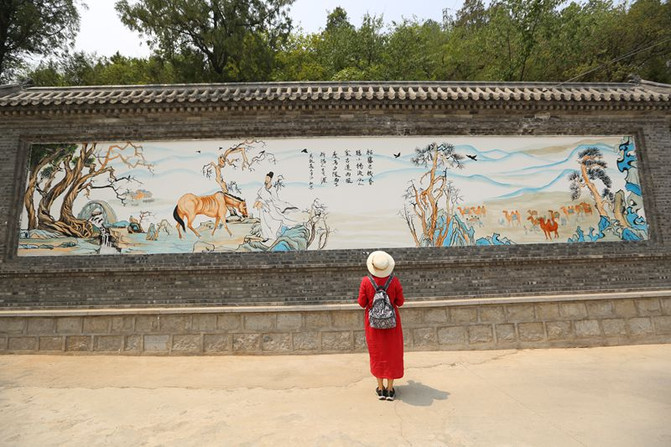
Shadow Wall in Xiluopo Village
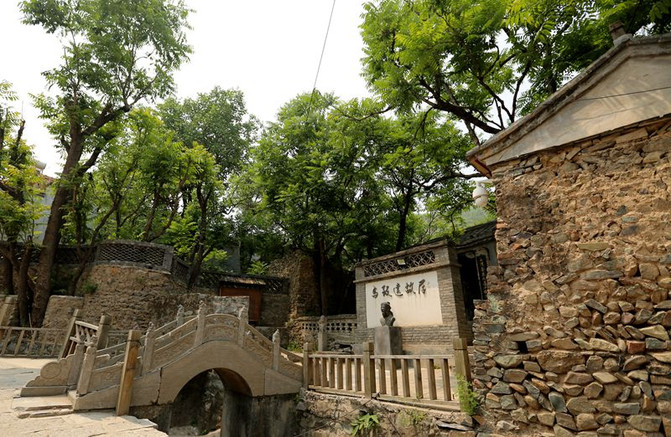
Former Residence of Ma Zhiyuan
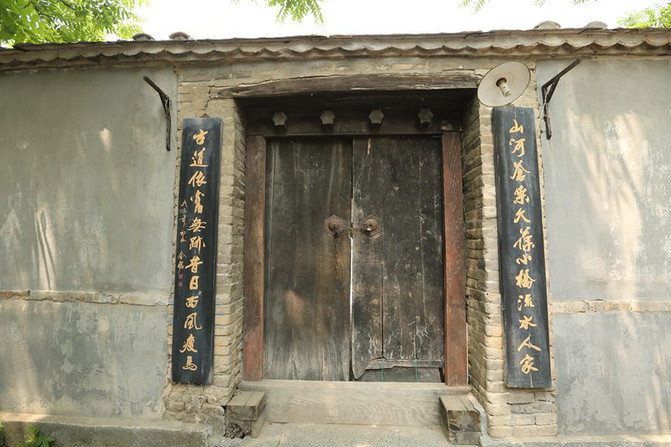
Former Residence of Ma Zhiyuan
Ma Zhiyuan's former residence faces west and is a large courtyard house. There is a small bridge and flowing water in front of the former residence. The shadow wall in front of the door reads "Ma Zhiyuan's Former Residence" and an introduction to Ma Zhiyuan's life. Behind the shadow wall is the courtyard. It was not open when we went, so we had to take some photos in front of the door.
Here I copy Mr. Ma Zhiyuan's words "Tianjingsha·Autumn Thoughts":"Withered vines, old trees, dark crows, small bridges and flowing water, ancient roads, west wind and thin horses, sunset sets in the west, heartbroken people are in the horizon." This poem can be regarded as a portrayal of the vicissitudes of the ancient road in western Beijing.
There is another poem in the introduction, which may be written about Xiluopo Village.
"Qingjiang Yin·Wild Xing":"The West Village is growing with fewer personnel, and a new cicada is making noise. Just as the sunflower bloomed, there was a swarm of bees, and the dream on the pillow went with the butterfly. "
After chanting Mr. Ma Zhiyuan's poems, I couldn't help but have the urge to write poetry, so I composed a poem to remember this trip:
Gu Daosi
The thousand-year-old ancient road in western Beijing,
The bell of the pack had dissipated in the valley,
On the bluestone of the ancient road,
It is engraved with the hardships of the pack.
Mountain winds pass through the city cave of the pass,
It was like the command sound of a pack crew driving mules and horses,
Step into the deep hoof nest on the bluestone,
Do you remember,
Ancient road west wind thin horse,
Watching the sunset set,
There are no longer heartbroken people in the world.
Previous Article:Beijing Pinggu Huangsongyu Weiyuan Boutique B & B, a favorite group building venue for young people, overlooking the mountains and rivers
Next Article:A good place to relax north of Beijing West Railway Station
